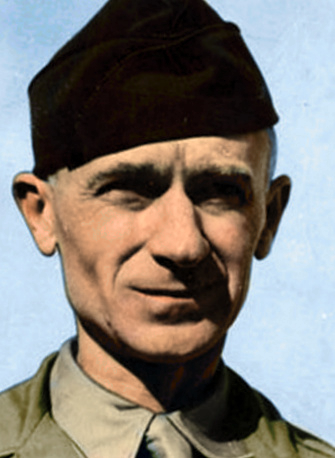The Pittsburgh Press (June 14, 1944)

Roving Reporter
By Ernie Pyle
Normandy beachhead, France –
On the way to the invasion, I rode an LST – the watery workhouse of this war. We carried armored reconnaissance troops.
We felt good about our position in the convoy, for we were about a third of the way back in the column. That meant we had ships on all sides of us and we wouldn’t be on the outside in case of attack.
Our convoy was made up entirely of LSTs. Each of us towed a big steel pontoon section, these to be used as barges and docks in the shallow waters along the beach. And behind each pontoon, we also towed a smaller pontoon with two huge outboard motors on it – a thing called a “rhino.”
Several ships broke cable and lost their pontoons during the journey. Special Coast Guard tugs were assigned to pick them up. We lost our own rhino on the last night out, and I don’t know whether it was picked up or not.
We were told that if the ship sank, our chances of being picked up would be slight. The water was so cold we would lose consciousness in 15 minutes, and die within four hours.
So, we all conjectured about the possibility of clambering out onto the trailing pontoon if the ship went down. That brought up the question whether the pontoon would be cut loose if the ship sank, or be dragged under the water by its huge steel cable.
To show how rumors get around, one soldier said he had learned that the ship had a sailor standing aft with an ax, for the sole purpose of hacking the cable in two if the ship were torpedoed. Later, I asked the captain, and he said there wasn’t any such man at all.
Funny little things happen in a convoy. The steering gear on one ship broke in midafternoon and the ship came slowly careening around like a skidding automobile until it was crosswise of the convoy and the ship behind had to veer around it.
You see, we were lined up in straight columns, extending as far ahead and behind as we could see. On both sides of us ran destroyers and corvettes for escort, but as I’ve said before, it never seems to the participants in a convoy that the escort is adequate.
Our only scare came late in the night before we hit the invasion area. I was in my bank, and the colonel with whom I was rooming came down from the bridge.
“How are things going?” I asked.
He said:
Terrible. Another convoy came along and pushed us out of the swept channel. One engine has broken clear down, and the other can only run at third speed. The wind and tide are drifting us toward the Belgian coast. We’re steering straight west but barely holding our direction.
I thought how ironic it would be to wind up this war by drifting alone onto a hostile beach and spending the rest of the war in a prison camp – if we didn’t hit a mine first. But fortunately, I was too sleepy to worry about it. When I awakened at dawn, we had both engines going and were back in line again in the swept channel. Moral: Always be too sleepy to give a damn.
My own devastating sense of fear and depression, of which I have spoken before, disappeared the moment we were underway. As I write this, the old familiar crack and roar of big guns is all around us, and the beach is a great brown haze of smoke and dust, and we know that bombers will be over us tonight. Yet all that haunting premonition, that soul-consuming dread, is gone, and the war is prosaic to me again. And I believe that is true of everyone aboard, even those who have never been in combat before.
The night before sailing, we were instructed to take two anti-seasickness capsules before breakfast the next day, and follow them up with one every four hours throughout the voyage. The capsules had been issued to us with our battle kits.
Well, we took the first two and they almost killed us. The capsules have a strong sleeping powder in them, and by noon all the Army personnel aboard were in a drugged stupor. Fortunately, the Navy, being proud, didn’t take any, so somebody was left to run the ships. The capsules not only put us to sleep but they constructed our throats, made our mouths bone-dry and dilated the pupils of our eyes until we could hardly see.
When we recovered from this insidious jag, along toward evening, we all threw our seasickness medicine away, and after that we felt fine. Although the Channel crossing was rough, I didn’t hear of a single man aboard our ship who got sick.
